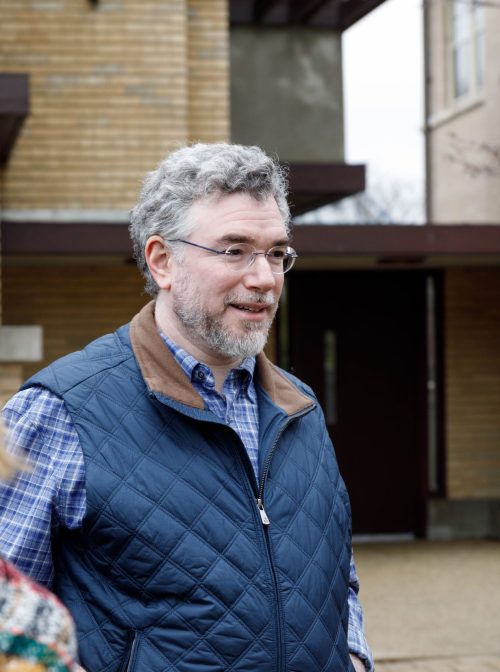Dialogue, particularly, between people who disagree can be a great blessing – indeed, in times like these it’s a necessity. When we engage people with different beliefs, we challenge our assumptions, reveal our blind spots, and deepen our thinking. We may even get closer to some kind of truth.
As our world is rocked by great conflicts, wars, and other upheavals, religious communities and their leaders have an important role to play in creating space for dialogue, and modeling what positive disagreement can look like.
This is challenging work to do across communities. Even within our communities, sometimes within our families, things can get heated. I have heard too many stories of family members walking away from a tough conversation – about religious practice, or vaccines, or the next presidential election – and not speaking to each other for months or years.
So: how can we hold space for ideological difference, so that disagreements can be constructive and not damaging?
Every religious tradition holds tools for constructive dialogue. In my tradition, Judaism, the art of debate, dialectic, and disagreement was refined during the Talmudic period (approximately 200-600 CE). The Sages of Israel and, later, Babylonia designed academies in which teachers and students discussed the laws of daily life, ritual practice, business ethics, family relationships, philanthropic priorities, and so much more. They succeeded in creating a multi-generational, meta-geographic conversation that in various forms continues to this day.
Every religious tradition holds tools for constructive dialogue.
They did so using several tools that I have found deeply relevant to our current moment. Here are three of them:
- Begin any potentially difficult group discussion by inviting the youngest person in the room to share their opinion first. This way, the group benefits from the perspective of youth, and the young person does not feel subtly intimidated or pressured to support the position of an older and more powerful member.
- Take time for one-on-one discussions, using the chevruta model. “Chevruta” is the Aramaic word for “friend,” and it refers here to a technique of paired study, in which two intellectual sparring partners read a text and then argue about it. Their goal is to disagree in order to reveal new perspectives on the text. In a traditional Jewish House of Study, you will find people raising their voices, maybe pounding the table, but, upon finishing a chevruta session, hugging or high-fiving.
- Always record minority opinions. The Sages did this over centuries, and so we have the gift of a serious documentation of dissent. As a result, the discussions are available to us in nuanced and multi-vocal form, and the tradition benefits from a multitude of perspectives.
When the Dalai Lama famously asked several Jewish leaders for their insight into how to help a community survive exile, they provided different answers. To me, the secret of Jewish survival in exile, without homeland or political power, is the Talmudic Sages’ ability to create a consistent yet flexible methodology for discussion, for processing new historical developments with space for multiple voices. Jewish people have been able to grow and evolve their tradition in creative and diverse ways because of these innovations.
Much more recently, a mystical teacher and storyteller in Ukraine named Rebbe Nachman of Breslov (1772-1810) taught his disciples a new model of constructive conflict. In the face of significant opposition by other groups, he developed an extensive theology of conflict. Here is one of his teachings on the subject:
“Know that conflict is a kind of Creation…. If all people agreed about everything, there would be no place for new worlds to be created. However, as a result of disputes, with each person withdrawing to a different side of an issue, space is opened between them, and in this space new worlds can come into being.”
Conflict between two people or groups is not inherently a problem – it is an opportunity. Just as a painter needs a canvas, a dancer needs a stage or dance floor, and a writer needs a blank page, we need to have space in order to create. Our disagreement creates that rich, high-potential space. Precisely where we disagree, there is opportunity for real growth.
We can therefore approach a conflict with excitement, and we can engage with it as partners in a creative act. Instead of asking, “How will I win this argument?” we can ask, “How will we work together to create something new here?”
Approach a conflict with excitement, and we can engage with it as partners in a creative act.
Imagine two people who are gently holding a large, fragile, and delicate soap bubble. If either one of them walks away, the bubble will pop. If they come too close to each other, the bubble will collapse.
The work of constructive conflict is similar. By carefully nurturing the spaces between us, neither stepping too far away nor collapsing the space by pretending to agree, we are able to hold our disagreements with care. When we see the space between us as a gift, our conflicts can become blessings.
Ariel Burger is a public educator and the author of the Publisher’s Lunch Club book, Indie Buzz Book selection, and National Jewish Book Award winner, “Witness: Lessons from Elie Wiesel’s Classroom.” He is the founding director and senior scholar of The Witness Institute, whose mission is to create a more compassionate and just world through public educational programs and leadership development. A Hasidic-trained rabbi, Ariel received his PhD in Jewish Studies and Conflict Resolution under Elie Wiesel. As a Covenant Foundation grantee, Ariel develops cutting-edge arts and educational programming for adults, facilitates workshops for educators, consults to non-profits, and serves as scholar/artist-in-residence for institutions around the world. Ariel is an Interfaith America Sacred Journey Fellow.




